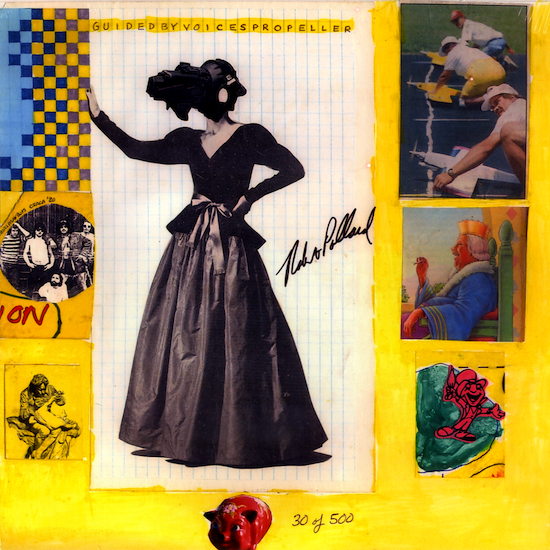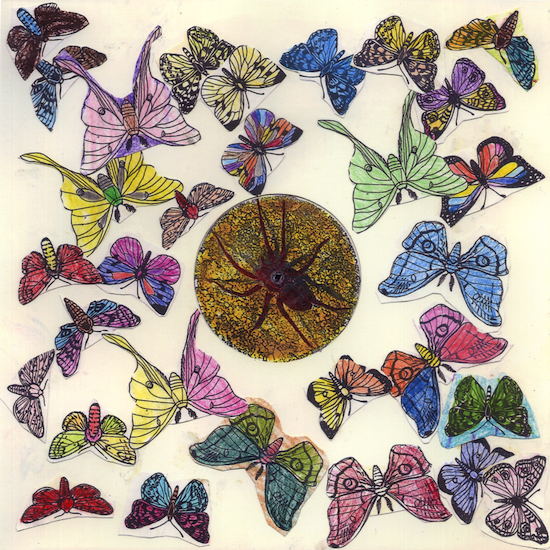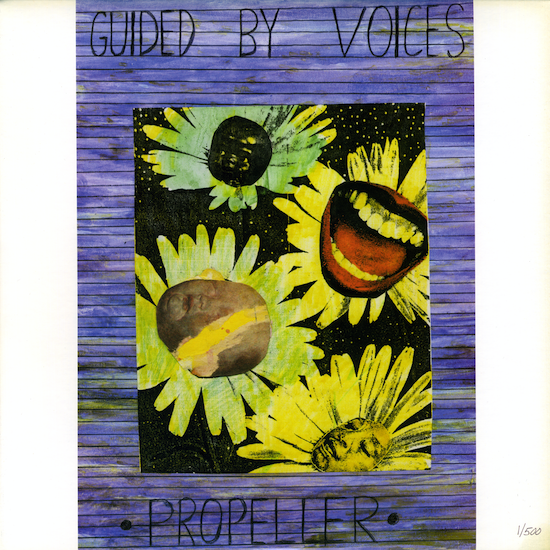With 35 studio albums as Guided By Voices, 22 solo records, and around 25 side projects, including a number with several albums, Robert Pollard is one of the most prolific songwriters of his generation. Having released 12 GBV albums since their most recent reformation in 2016, and with another scheduled for release in March, Pollard shows no signs of slowing down either. Richard Meltzer wrote of the first time he saw GBV play: "British Invasion garage band — what more could you want?" Whilst the transgressive American poet and novelist, Dennis Cooper, believes Pollard to be "the greatest rock lyricist of all time". Another famous fan, the film director Steven Soderbergh, in his introduction to James Greer’s Guided By Voices, A Brief History, wrote "My Best of GBV playlist contains 123 songs" and somewhat more enigmatically, "GBV is like a great breakfast cereal with a surprise inside."
Explaining his reasoning, Dennis Cooper writes: "[Pollard] juggle[s] techniques associated with surrealism, the absurdists, realism, conceptual and postconceptual art, art brut… creating a kind of history-of-aestheticism montage aspect. At the same time, he tosses off ideas and metaphors and similes with such seeming spontaneity that his lyrics function equally as a random, crazy energy that jitters inside each song like lightning in a bottle." The late Cars frontman, Ric Ocasek, who produced their 1999 album, Do The Collapse, made a similar point more prosaically when he said: "Bob’s one of the best songwriters around. He knows how to do it. And I don’t think he even tries. He just has that natural knack." Cooper and Ocasek’s comments, taken together, capture the essence of Pollard’s prolific artistry perfectly.
Propeller was Guided By Voices’ fifth album, which Pollard had jokingly suggested was a last-ditch effort to ‘propel’ the band to fame and fortune. Looking back at the four albums that preceded it, it’s clear that something different was going on, and that this, whilst far from being the end of GBV, was the first time that their ideas and working methods coalesced into a coherent identity. Early adopters of the lo-fi rock aesthetic with their 1987 debut album, according to Pollard, they decided to use a 24-track studio to get a more "professional" sound for Propeller. Then, deciding that the overall sound was a little sterile, Pollard decided to "re-EQ certain songs as well as add some 4-track stuff and a few songs we had recorded earlier that year as Academy of Crowsfeet, in order to give the album more variety both in songs and fidelity". It was intended to be the final album mainly for financial reasons and domestic pressure, but that very fact concentrated their energies. Pollard recalled:
"We were having more fun and getting creative. We decided to reincorporate the lo-fi aesthetic that we applied on Devil Between My Toes. I really, at the time we recorded that, had no idea what lo-fi even meant. I simply decided I was going to put my favourite songs on the album without regard to how and where they were recorded. It became, in my opinion, a much more interesting record. This was in 1987 and we were way ahead of the movement that appeared in the early 90s with Sebadoh, The Grifters, Wingtip Sloat, Truman’s Water and bands like that. I love the records those bands made during that time."
Released originally in a run of 500 vinyl copies, the loan the band had taken to cover recording had run out. They couldn’t afford to extend it further, so they decided to do the covers by hand on white stock LP jackets. It took a month to get them all done. The decision, made mainly out of financial expediency, fitted perfectly with Pollard’s long-standing interest in collage and DIY aesthetic and eventually made them rare collector’s items, fetching in one instance over $6,000. According to Pollard, who was still working as a schoolteacher at the time:
"I gave everyone in the band plus a few other friends the homework assignment of coming up with 20 covers a piece. The back was just a photocopy of some drawings of wrestlers that I found and threw together with the hand printed titles and credits. Different people did the colourings. My brother [Jimmy] did the coolest, most elaborate ones. It did, in essence, propel us to whatever level of success you want to call it. Influential people in big cities on seminal indie labels like Drag City and Matador had somehow gained access to it. So it kept us alive and got the ball rolling. We got signed by Scat. We played the CBGB show and very shortly thereafter got signed by Matador. If that chain of events hadn’t transpired it more than likely would have been oblivion for us."

Opening track ‘Over the Neptune/Mesh Gear Fox’ is such a classic expression of GBV intent, with its mocked-up recording of a crowd going wild for the band, chanting “GBV, GBV, GBV” (when in reality the band hadn’t played live for some time and even then, only for very small local crowds), that it’s almost like a magical invocation, a visualisation of the potential to become the band Pollard wanted them to be. The lyrics too, read like a GBV mission statement: "Let’s throw a great party/ Today for the rest of our lives/ The fun is just about to get started/ So throw the switch, it’s rock and roll time". Pollard recalled:
"We came up with the fake intro in the studio by overlapping the chant with a section of a live Needmores recording. It was very gratifying when the crowds started actually doing it. The first time was in Chicago and afterwards in the dressing room, Liz Clayton, an indie rock journalist friend brought it to my attention. We both thought it was hilarious but also very moving. It was a defining moment for our live performances."
‘Quality Of Armor’ and ‘Over The Neptune’, are GBV’s first great anthemic rock songs. Chugging along like a British Invasion-tinged Ramones, ‘Quality Of Armor’ compresses the American obsession with the freedom of the open highway, thoughts of mortality, the warring nature of mankind and the question of whether God exists into a blistering pop-punk nugget of two-and-a-half minutes: "Oh, yeah, I’m going to drive my car/ Oh, yeah, I’m going to go real far/ As we were sitting there in the final stages/ Staring at the screen as the battle rages/ You were finding God in the dictionary/ Taking photographs in the cemetery". Pollard recalled:
"‘Quality Of Armor’ was written in 1979 when I first started getting into post punk and Wire. I almost formed a band with some older guys who wrote radio jingles in the early to mid 70s and then were later in the punk band called The Rulers and that was going to be our hit. So yeah, it has a special place."

Despite the fact that Propeller was supposed to be Pollard’s last roll of the rock dice, in reality it would prove impossible for him to give up using that "natural knack". Tobin Sprout, who played on the band’s debut LP in 1987 and was a member for ten years, said:
"We had practiced at [original drummer] Kevin Fennell’s and after the practice, we were walking out to the car and Bob goes ‘This is it, I’m not going to do anything after this. It’s going to be my crowning achievement.’ He was really bummed out. The next morning, around 7 o’clock, I got a call from him and he’s all fired up and says ‘I’ve got to come over’. He comes over and he runs through ‘Exit Flagger’, the chords, two or three times, it’s kind of repetitious. Once I’d got that, he sat down at the drums, I played the guitar, and then we mixed those three down to one track, then Bob added vocal and maybe put the bass on there. Then for that lead at the end, I had to punch in at Bob’s vocal track. I had to be real close but there’s a little lag before the guitar comes in. I just remember all of a sudden he was fired up again and we recorded that song in maybe twenty minutes and it was gone."
‘Weed King’, a mini prog-garage epic with suitably self-mythologising lyrics eulogises GBV’s own record imprint: "Long Live Rockathon/ Offspring and Tag alongs were finding/ The history book has lost its binding/ Pages everywhere/ Two Titans without care will read them/ We conjure ghosts and then we feed them". ‘Metal Mothers’ stretches out a beautifully melancholic melodic line into an impressionistic smear of squalling guitar by its end. ’14 Cheerleader Coldfront’ is a nicely observed acoustic vignette. ‘Back To Saturn X Radio Report’ experiments with a cut-up format, foreshadowing future GBV work such as Bee Thousand both in its playful attitude to sonic fidelity and in actual song snippets. Whilst ‘On The Tundra’ seems to refer to the band’s financial situation and look forward to a time when things might be different: "And then one day/ Maybe today/ We’ll justify the joke/ Make it our day/ And blow the total savings/ To satisfy our cravings".

As luck would have it, Propeller began to get noticed in some circles, most notably by the likes of producer and musician Matt Sweeney and Pavement’s Mark Ibold, who was also a keen record collector. Sweeney wrote a fan letter to Pollard and received the entire GBV back catalogue in return. The album found its way into the hands of Scat Records owner, Robert Griffin, who offered them a deal. A show at CBGB in New York was scheduled for July 1993. Tobin Sprout recalled:
"Matt Sweeney got a hold of it and was playing it for all his buddies. Sonic Youth was in that group. We had this underground thing bubbling up all of a sudden because of that. CBGBs was one of the first, might have even been the first show we did live besides in Dayton. There was never really a Guided By Voices [at that time] because we were not playing live, whoever showed up at the practices and was good enough to play was in the band. It got to a point where [there] was this energy happening. Like this was going somewhere and we’d just have to ride it… It just kind of took off and that first year we were just flying and then Alien Lanes came out and we toured that. I was thinking, ‘We’re way over the hill’ – I was 36 when we put it out and I was like, ‘This is crazy.’ I told Bob [that] all the albums [he’d] made years ago, [those] six or seven albums, they were now all valid, ‘We’ve gotten to a point where those are going to be listened to and looked for.’ So it was, all of a sudden, an awakening. That we actually did it. We were there. From Propeller to the time Bee Thousand came out there was just this build, build. We played Irving Plaza, opening for Pavement and that sort of thing.”
Undoubtedly, a large part of the appeal to those just discovering GBV for the first time was the fact that Propeller had a refreshing and individualistic air of being not the usual kind of ‘product’ being churned out by the record industry. It was simultaneously highly creative, idiosyncratic and off the cuff. Despite the large volume of music Pollard would in release in the future, and the difficulties this would entail for record companies and record stores alike, paradoxically the ‘non-product’ aspect of his work persists to this day. Usually, something ‘rare’ is admired for that quality, and things that exist in abundance are taken for granted. Pollard is so productive that it’s easy to see how people who aren’t die-hard fans might experience ‘Pollard fatigue’. But the fact of the matter is, it is Pollard himself who is that truly rare thing, the artist who lives and breathes his art and sings the inspiration of his muses, both for his own pleasure and the enjoyment of others. In truth, GBV might well have experienced a more successful career arc had they eked out their releases in a more economical fashion. Pollard, however, can’t seem to help himself. Which is good news for the fans, particularly considering the high quality of releases over the years.
Although it’s often releases such as Propeller, Bee Thousand, Alien Lanes and Under The Bushes, Under The Stars which garner all the critical attention, I personally would argue the case for Universal Truths And Cycles, Earthquake Glue and Half Smiles Of The Decomposed (all released between 2002 and 2004) as being high points in the band’s back catalogue. Their last three records, Earth Man Blues, It’s Not Them. It Couldn’t Be Them. It Is Them! and the forthcoming Crystal Nuns Cathedral are just as strong as that earlier trio of releases. Live too, the band are currently exhibiting excellent form. When they returned to the UK for the first time in 16 years, to play two dates at the Village Underground in London in June 2019, they played over 50 songs and performed for three hours each night without an intermission. Pollard joked that he’d only stop putting out records “when they put me in a hole in the ground”.

I suggested to Pollard that perhaps the break up and reforming of the band might be an essential part of the process. He replied:
“A break up occurs, for whatever reason, when it’s absolutely necessary. It’s not essential. It’s just the way it works out sometimes. A sort of complacency sets in but that’s not happening now and hasn’t for a long time. There is incredible chemistry with the new line up and that includes Travis [Harrison], our producer, who I consider a member of the band. We just have a winning formula with the process which has everyone involved. Their input is very valuable and we’re getting more comfortable with one another and better all the time. They’re all extremely smart and talented. They’re enthusiastic about the continuity of what we’re producing.”
Pollard is now 64 but if the stamina he displays at live shows and the enthusiasm he has for his current recordings is anything to go by, there’s plenty of life and music left in him yet. Long Live Rockathon indeed.
Guided by Voices’ Crystal Nuns Cathedral is released on 4 March. With thanks to Jeff Warren and David Newgarden


